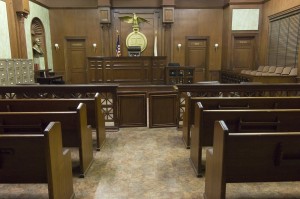 Your Day In Court
Your Day In Court
The day of reckoning (for your marriage, anyway) is almost here. You are probably a little nervous about your court appearance. Your attorney should help prepare you for this appearance, but we offer a few tips here to try to calm the nerves.
What to Wear?
The biggest thing to understand about choosing what to wear in court is that you need to show that you respect the court and its authority. There is a reason that attorneys wear suits in court all the time! Choosing to dress in outrageous or too hip or too casual clothes may convey the message that you do not take the process or the judge seriously. The last thing you want to do is tick off the judge, or make them raise an eyebrow at the outfit you have chosen.
The judge understands that not every male has a suit, or can’t afford to buy one. If you do own one, it is probably a good idea to wear it. If you do not own a suit, just dress in nice clothes – dressier pants, collared shirt, shoes (not sneakers). Again, the main thing is to show your respect in your wardrobe choices.
Women need to be careful to dress appropriately as well. No short skirts, major cleavage or too-high heels. Save those outfits for recreational purposes, not the courtroom.
The most important thing to remember is that if the judge has to decide on issues in your divorce, you want that judge to view you as a responsible adult, one who warrants a decision in your favor. The appropriate clothes can help make the right impression, and may work to your advantage.
Where Do I Sit?
For most hearings, you will sit with your attorney at one of the tables toward the front of the courtroom. Your attorney will guide you in this matter. You wait in the gallery (audience) section of the courtroom or outside in the hall until your case is called. Once it is called, you make your way to the front of the courtroom and take your seat.
You will only be on the witness stand if you have to testify as to any outstanding issues. If all the matters in the divorce have been agreed to prior to the court hearing, then you likely will not be called to testify. The judge may ask you if you are aware of all the terms of the settlement agreement and if you have freely consented to them, but that answer can come from you at the table.
What Do I Say?
Your attorney should prepare you for your testimony (if necessary). They will instruct you how you should answer the questions. The general rule is that you only answer the question you are asked – answer very narrowly and don’t offer more information than the question calls for. Straying from the issue can muddle the facts and possibly affect the outcome.
This phase of the hearing should be very well planned out. You must absolutely tell the truth in all matters, and you want to stick to the facts you want the judge to focus on.
Be clear, be precise, be truthful and cooperative, even (or especially!) with the opposing attorney. Nothing is gained by being rude, stubborn or sarcastic in open court, and you may hurt your case. No snide remarks about your spouse, or rehashing the old arguments.
R*E*S*P*E*C*T (with apologies to Aretha Franklin)
The word of the day is respect. You need to respect the court, respect yourself , respect the attorneys and most importantly, respect your soon-to-be former spouse. The judge can tell a great deal about a person from their appearance, their behavior in court and the manner in which they treat other people. On this extremely important day, you want to put your best foot forward and make the best impression you possibly can. If there are still contentious issues, a great deal can depend on how your present yourself in court. It benefits you greatly if the judge views you as a respectful, responsible, even-keeled person, one who is fiscally responsible and capable of caring for children.
